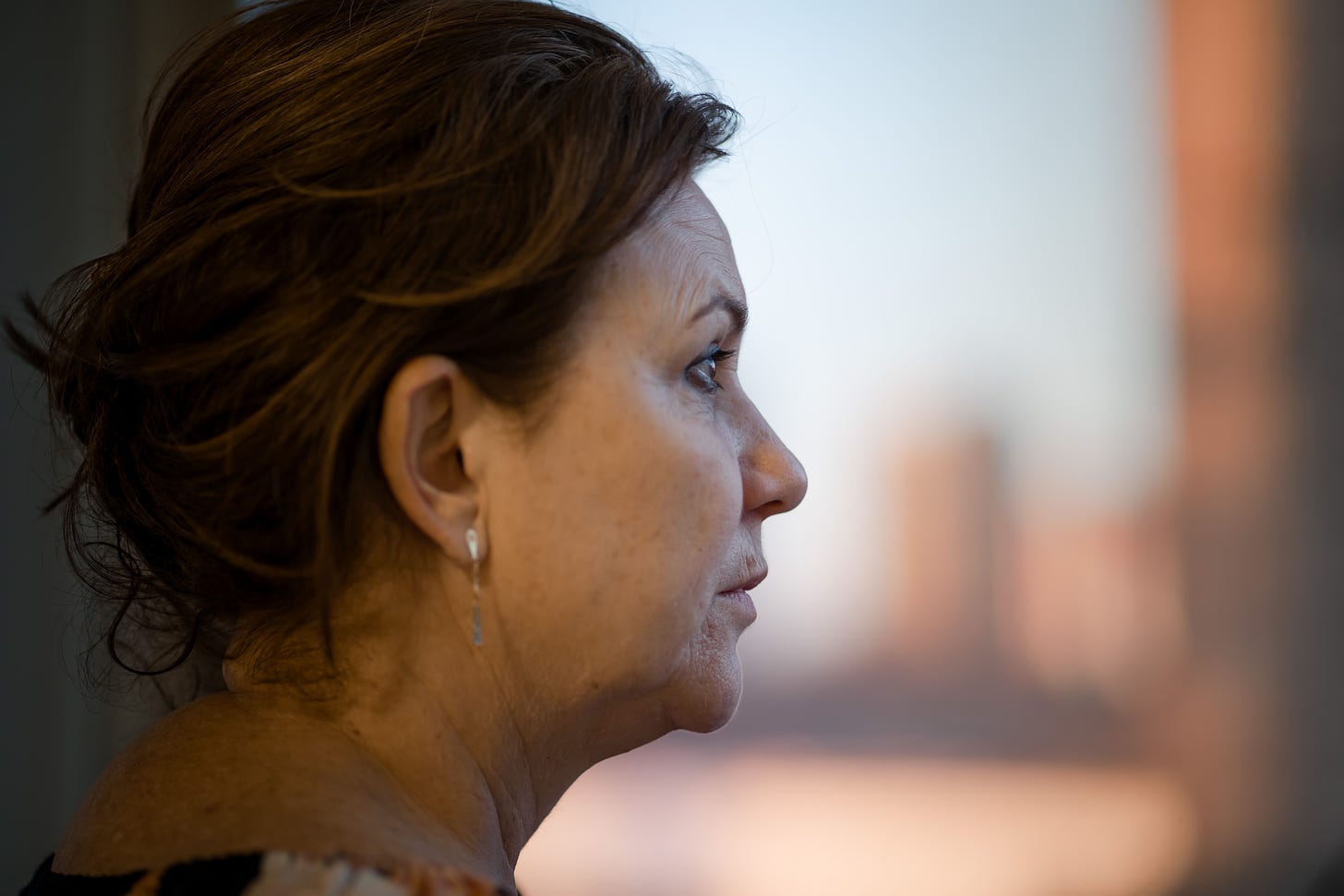By the time women’s perimenopause begins in our late forties to early fifties, we have experienced three to four decades of shifting hormones and the cramping, bloating, headaches, weight gain, sleep disturbances, migraines, and mood swings that come with it. Many of us are relieved by the finality that menopause signals. That said, women who wanted to be biological mothers may feel deep grief as this door closes.
Compared to all the other transitions that are part of midlife, nothing else has such comprehensive effects as our changing hormones. As the ovaries reduce their estrogen output and slip gracefully into retirement, disrupted sleep, dryness (everywhere!), decreased libido, hot flashes, night sweats, brain fog, weight gain, and depression often begin (depression spikes for women in midlife). Symptoms vary and depend on any number of factors, including overall health, stress levels, diet, smoking and drinking habits, and exercise—or lack thereof.
Being prepared for menopause helps immeasurably. However, some symptoms may surprise us. Despite reading MANY books and asking MANY older friends to share their experiences, no one mentioned increased anger. Up to this point in my life, I had been anger-avoidant—especially with men. Menopause changed that.
The misogynistic micro-aggressions that I had tolerated for the past fifty years became intolerable. I was no longer okay with being derisively referred to as a girl and I surprised myself by shutting down the men who told crude jokes in my presence. I no longer aspired to be nice. My husband has always appreciated how anger gives him a laser-like focus. Once I turned fifty, I began to understand this phenomenon.
Regardless of which symptoms hit you hardest, one thing is true for all women: we need to talk about this frequently and vulnerably. The more we talk, the less lonely or confused we will feel. Many of the cultural narratives surrounding menopause are both unhelpful and untruthful. God designed our bodies intentionally, including these midlife transitions. Our lives are not over and we’re certainly not done being productive or relevant. Despite the disequilibrium and inconvenient symptoms that accompany menopause, this season can be dynamic and fruitful. After you read Sage Forum contributor Rachel Campbell’s thoughts (below), consider finding a few friends who are willing to talk about their change of life experiences and celebrate this new season.
For the Sage Forum team,
Levelling up: The Universal, Unique Menopause
by Rachel Campbell
Menopause is the great leveller. It is the universal experience of all women. And with 90% of us going through menopause after the age of 40, menopause is central to who we are at the Sage Forum. We are women who, with this commonwealth of life experience, have the opportunity to support one another with a maturity that we lacked in our carefree puberty years when our reproductive cycle kicked in.
Menopause is universal but it’s also unique. According to Sophie Elletson in her book Future Woman, each one of us will experience a combination of the thirty-four physiological changes that mark the menopause process. Most of us are familiar with the common symptoms, such as hot flashes, but there’s likely to be a few that take us by surprise. For instance, I was blindsided by a sudden attack of vertigo! I developed unexpected palpitations and sweaty palms driving over high bridges that I’ve crossed hundreds of times in the past. Mercifully, that particular little ‘joy’ has passed but only after I’d contemplated (often through sleepless nights, another common symptom of menopause) the life-altering possibility of having to give up driving!
Our individual menopause profile will further be shaped by the uniqueness of our life’s circumstances. At the beginning of puberty, we were almost certainly enrolled in school. In our 40’s and 50’s, our roles and responsibilities are anything but uniform. At this stage of our lives, we’re dealing with all the complexities of family relationships plus work, community, and/or church responsibilities. Our busy lives often work at odds with the unexpected arrival of often debilitating, seemingly random, and prolonged (sometimes for years) perimenopausal and menopausal symptoms.
Menopause provokes varied reactions in the women I’ve known. Many experience a sense of freedom and relief. As soon as one friend completed her family in her early 30’s, she announced that she couldn’t wait for the menopause so that she could be free from her now-redundant monthly bleed.
However, while we may have said a relieved farewell to our periods, it’s worth remembering that the estrogen still working in our bodies may have a last hurrah in the first couple of years after our regular monthlies have ended. Another friend reported to me that while she was on vacation, a sudden, scary heavy bleed resulted in an emergency admittance to a Spanish hospital.
For others, menopause may reignite a palpable sense of grief in women who never bore children. The sorrow can amplify the emotional and physical changes of menopause, and it merits care and attention.
For most of us, menopause offers us an accounting as we begin to feel more deeply how much of life has passed. Perhaps we miss our slimmer waistline, glossy hair, and youthful energy. Perhaps we question our purpose now we have not only closed but bolted the fertility door. And all too often this loss and questioning is exacerbated by churches that have bowed to the culture of the age where youth and beauty are worshipped over maturity and sanctification.
The Bible doesn’t sideline or marginalize post-menopausal women. God is at work in every season of our lives. Sarah was beyond child-bearing years when she had Isaac (Gen 17:17), and Elizabeth was ‘very old’ (Luke 1:7) when she conceived John. Two post-menopausal women who miraculously bore sons –but these stories are about more than just incredible births. They are about the inclusion of older women in God’s great salvation plan. The stories of Sarah and Elizabeth are intricately woven into the story of the Savior Himself.
In this post-Resurrection age of the Church, God continues to use His cherished older daughters in His plan to call all people to Himself. Romans 16:1-2 details Phoebe’s spiritual resume as a deacon of the Church at Cenchreae and a benefactor of ministries including Paul’s. Phoebe was a mature woman of faith with a proven record of ministry which is why Paul chose her to carry, and likely explain, his complex theological treatise to the churches in Rome.
For Sarah, Elizabeth, Phoebe and others in the Bible, God’s greater glory and purpose was revealed in their later years. In the universal and unique menu of menopausal symptoms and emotions, His grace is sufficient and His power is made perfect in our weakness (2 Corinthians 12:9). And while we’ve said ‘goodbye’ to the time in our lives given to physical reproduction, our spiritual fertility lives on.
Talk about it with friends: What has been most challenging part of perimenopause/menopause for you? What physical symptoms and emotions have surprised you about the process? Has your sense of mission and purpose shifted?
Additional reading on the subject of menopause
A collection of great reflections on menopause at ThePerennialGen.com
Holy Hot Flashes! A Spiritual Take On Menopause
Two reviews of Cheryl Bridges John’s worthwhile book Seven Transforming Gifts of Menopause here and here.
We want to hear from you – and amplify your insight with our growing community of readers! If you have a reflection or devotional piece (like this or this) that you’d like us to consider for publication, click here to send us an email that includes the text of your piece pasted into the body of the email, along with a 2-3 sentence bio. You can use that email link if you have questions, too.
Media Picks from the Sage Forum team
[BOOK] There Was an Old Woman: Reflections on These Strange, Surprising, Shining Years by Andrea Carlisle. This is an excellent essay collection about aging, when we both look back and live vibrantly in the present. Wise, womanly, and wonder-filled—essays to savor. (CD)
[BOOK] The Life We’re Looking For: Reclaiming Relationship in a Technological World by Andy Crouch. What a deeply thoughtful book about the culture of our age, including gender and AI, and also the culture of early Christianity. Crouch writes about what keeps us from developing relationships as God intended by looking at the words that shape us or blind us, including the words mammom, gifting, charmed, blessed, and household. (AR)
[NEWSLETTER] Tangle. In an effort to understand the polarizing political landscape, I started reading the free version of this newsletter by Isaac Saul. Saul culls and summarizes information from resources on the right and the left, including links for further reading. In his bio, he states, “I’m a politics reporter who grew up in Buck County, PA—one of the most politically divided counties in America. I’m trying to fix the way we consume political news.” (AR)
[VIDEO-Netflix] Nate Bargatze: The Greatest Average American. Stand-up comic Bargatze’s observational storytelling is laugh-out-loud funny, with the added bonus that he veers wide of raunchy humor. If you enjoy the comedy of uber-dad Jim Gaffigan, you will probably like Nate Bargatze. (MV)
What are you reading, watching, or listening to this month?
Back To School in Midlife
Sage Forum contributor Rachel Campbell talks with Michelle Van Loon about why she decided to become a seminary student as her kids were leaving the nest. Visit or subscribe to our YouTube channel for other half-hour conversations about topics of interest to women in the second half of life.
Miscellany
Next month’s topic: Grief and loss. If you have a resource on the topic (book, website, podcast) you’d like to recommend, please send it our way.
Sage cohort: We heard from a couple of people who were interested in being a part of a Sage Forum monthly cohort to meet to discuss topics relevant to those of us in our Sage years (click here to look at the Table of Contents in the book that started it all). We’d love to have at least 7-10 in this group, so we will wait until after the holidays and put the ask out there once again.
HopeWords 2024: The slate of speakers at the HopeWords 2024 writer’s conference includes Daniel Nayeri, the author of Everything Sad Is Untrue, along with a fantastic mix of other writers. Click here to learn more. Some from the Sage Forum team will be there, and we’re hosting a special gathering for our friends the morning of April 12th before HopeWords kicks off later that afternoon! Contact us if you’d like to be added to our list for more information about our gathering.
They will still bear fruit in old age, they will stay fresh and green, proclaiming, “The Lord is upright; he is my Rock, and there is no wickedness in him.” (Psalm 92:14-15)
Photos by Vinicius das Neves, Christin Hume on Unsplash.








I have also experienced this sudden intolerance of the "misogynistic microaggressions" I had simply shrugged and put up with most of my life. And last week, when I bumped my head hard on an overhanging shelf, then immediately proceeded to pinch my hand in a paint roller (??) I had a momentary outburst of rage that absolutely terrified my husband--so much so that he didn't bring it up for several days. Poor guy, haha! I hadn't considered either of those as hormonally based, but your words make sense.
I actually have a humorous (plus a little angry) rant about menopause ready to hit my own Substack tomorrow morning--Tuesday, Oct. 3. 'Tis the season, I guess. Thanks for the consistently great content here.
I’d definitely be interested in a monthly cohort!